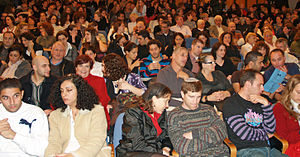httpv://www.youtube.com/watch?v=T-3oCa07kjM
"A Chicago news anchor enraged parents when she announced during a segment on children's gift expectations that Santa Claus isn't real.
During a conversation with her cohost about how long children should believe in Santa, Robin Robinson, a news anchor at Fox Chicago since 1987, argued that kids should learn early on that Santa isn't real."
You can read more about this story by clicking
here.
DEBATE
- Would you be angry if your child heard this report?
- Do all Spanish children believe in Santa Clause?
- When did you first learn about Santa Clause?
Word |
Image |
Definition |
Example |
Listen |
Anchor |
 |
A person who is the main broadcaster on a program of news, sports, etc. |
Princess Leticia used to be an anchor. |
Listen |
Angry |
 |
To feel upset |
I am ANGRY when I shout. |
Listen |
Apologize |
 |
To say that you are sorry |
I apologize for breaking your window. |
Listen |
Gift |
 |
A present |
A Christmas present gift |
Listen |
Audience |
 |
A group of listeners or spectators |
Let's ask the audience. |
Listen |
TV Viewers |
 |
People who watch tv |
The show Friends had many tv viewers. |
Listen |
Slip-Up |
 |
Error, lapse |
What I said was a slip-up. I never intended to offend her. |
Listen |
Overwhelming |
 |
Overpowering in effect or strength |
As I entered the graveyard I felt an overwhelming desire to leave. |
Listen |
SPARE A THOUGHT
If you think you're having a bad day, spare a thought for Robinson.....?
Listen to the first 10 seconds of this video and see if you understand what this expression means... Spare a thought click
here for answer.
TEST YOUR KNOWLEDGE







